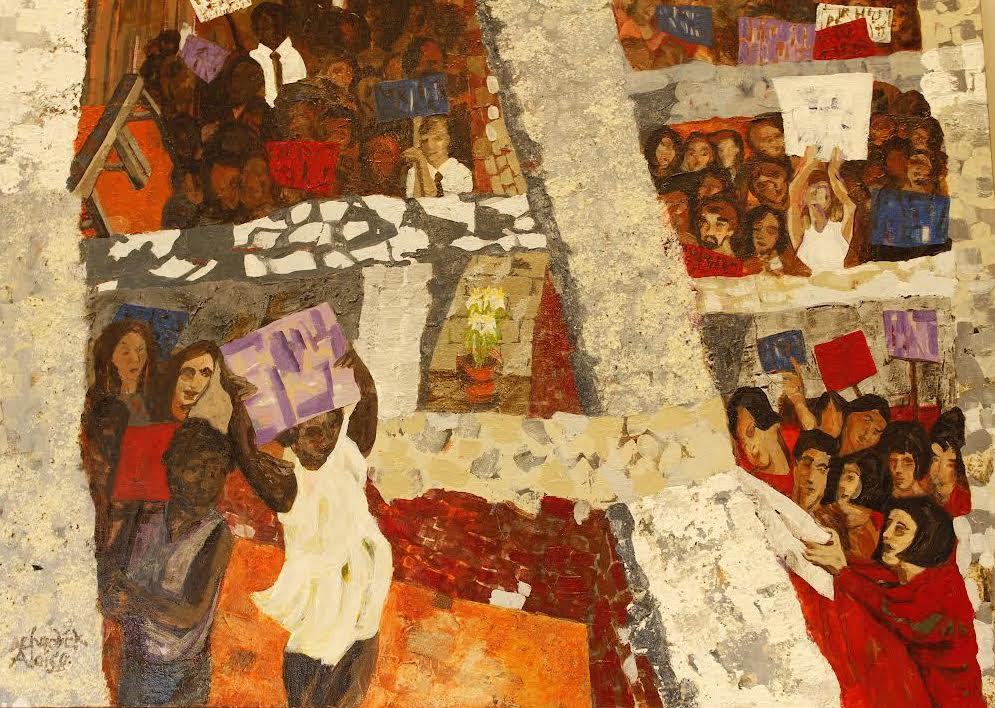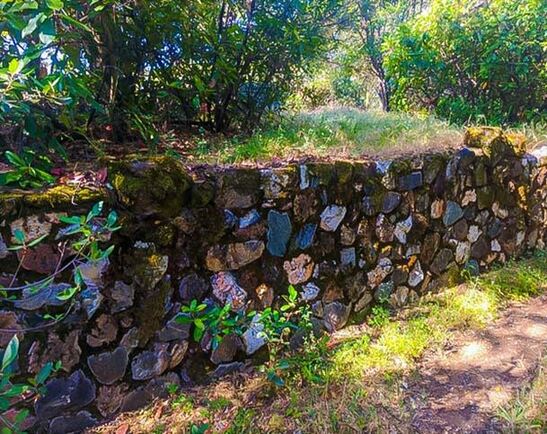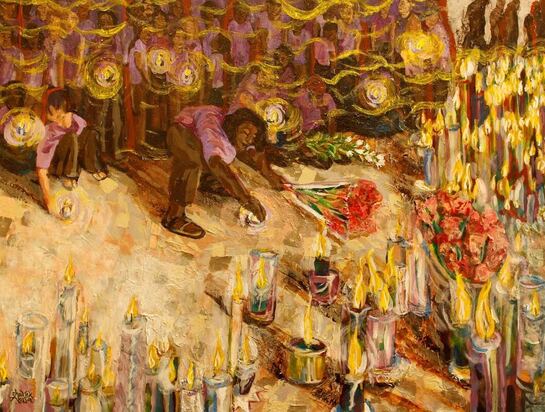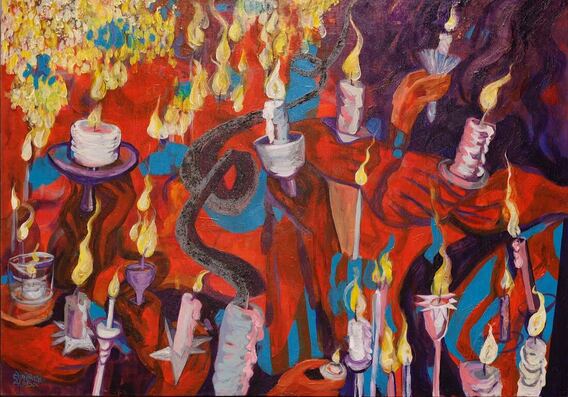|
Peace Lily (with Peace Walls Leading to a Haiga) 1. Good fences make good neighbours So chimes the grey-haired poet. But what of walls? 2. Sometimes it takes a wall to keep the peace-- That’s what the Ulster Irish say and exactly What I saw standing on the Falls Road, Belfast, Where that straight thoroughfare of spite flanks The Shankill Road. There it towered, a wall aloft, A wall for peace, formed from iron, brick, and stone, Plus shards of broken glass, whatever they could grab To launch their peace-complacent wall higher, Higher into the Ulster sky into the British heaven— Each day before my foreign eyes it rose and rose To strech its stated end: corral the hate, Defend against the dragon and keep the peace. 3. And in the middle of the picture sits a single Lily, a lily in a painted pot at the center Of a space made safe, secure by surrounding Walls—imposing, four-square forms wrought From brick and rock and mortar—stiff stuff set Firm and tough enough to keep the peace. 4. And the memory-keepers sang: The burning walls and tower And Agamemnon dead And Humpty Dumpty sat on a wall Humpty Dumpty had a great fall. 5. Since so much depends Upon a painted lily in a pot Safe within its walls, Strange it seems how no One really sees the flower Yet the peace it promises That’s the power people love (It’s what they lack and long for) So they cheer the lily’s unseen Blossoming—a gift of hope, A hope that drives out fear, For this they cheer, raising Signs and songs unto the lily In the little painted pot Safe within the walls four-square. 6. Three times Achilles chased him Round the walls and towers Ringing Ilium, three times Hector Passed his wife and kin atop The ramparts gasping, groaning As the son of Peleus gained ground On the fleeing prince. Then the fourth Time round the walls sorrow swept The crowd who watched their lover, son And brother fall-- Death’s dark curtain dropped . . . And round the walls, Achilles dragged the prince Dragged his corpse face down behind his glinting Chariot through the bloodied mud and dirt. 7. Sometimes it takes a certain kind Of wall to strike what’s called a Separate peace, at least that’s what I mean to say to end this painful Chain of word and image verse-- 8. So in that spirit here’s a haiga, A picture and a poem in tandem About a man named George, George Yamasaki born in Osaka, But raised in Northern California, A man they tried to cage and break Behind a fence of coiled concertina wire, A man whose soul they tried to snuff Stealing his nursery, trashing his orchards, Torching his home when war broke out in ’41. But George refused to break, refused to die, Refused to fade away like lilies of the valley-- And when the war was done, home he came To the rolling hills round Auburn, Then set to work raising walls again, Rebuilt his life stacking quartz and granite Not just to feed his boys and wife . . . No, George showed that though they tried To bend and bow him like a bonsai, to cage Him like a magpie, he refused to bow or break: Back from camp at Tulelake Yamasaki built these walls Freestones in mortar Thomas McGuire ** In the Year of the Drought We pray for a good year the way my grandfather once prayed for rain for the field below his house, the water that would make that red Carolina soil run like blood across the drive. The good year: annus mirabilis they call it, the year of wonders— Newton at 23, writing the law of universal gravitation while Cambridge locks its doors against the plague, an equation cold comfort in a graveyard full of his friends. Outside the water pools over gutters, forces itself against basement windows but when I pull the kitchen curtains in the morning’s dim haze, the ground is still dry. Could this be the good year? the wonder we feel has turned to something else entirely, venom rising at the back of the throat, marching toward what burns and writhes in the dark—our insides turned out on TV, while the midwife undoes clasps and ties to make the birth easier, not a knot left in the house. What I bring into this world is more of the same: the apple falling from the tree, the torch turned into candle, grief upon grief. Late at night, I think I hear you fall in the bathroom in a dark house— but you’ve been in bed for the past three days, unable to walk or raise a glass of water. Don’t you know we all become the same things in the end? In this year without rain, all the window ledges are bare, open to let in the night air and to ease the inevitable birth pangs of a world made more undone with each arrival. Sarah Nance A Wave inside a Wave Maybe they were slippery because they were swimming Maybe they were surfing and they caught a wave inside a wave Maybe they were waving hi but their hello wave had undercurrents of goodbye Maybe they were a political movement and inside a loud and forceful wave there was a smaller quieter wave pulled along by the bigger one shushing out onto the beach just inside the one wave arrives another wave ** Burning Down the House Fear turns a light breeze into a tornado. Don't forget: every time you make dinner you create one or two little fires in the kitchen. That's you, you're the little fire, you're not hurting anything, not yet. "Those two are getting along like a house afire," our friends said. It's true, we were as compatible as sandpaper and a match. We stayed together to the end, which came fast. Don't worry, ladybug. Your children won't necessarily combust, no matter what you've heard. It's the poem that's blazing up, from the kindling of the bad rhyme. HOME and BURN, ladybug. BURN and HOME. Jessy Randall ** A version of this sequence was exhibited at Bella Art in Monument, Colorado in September of 2021. “Burning Down the House” first appeared in Injecting Dreams into Cows (Red Hen, 2012). ** Pam Chadick Aloisa has had paintings exhibited regularly in many juried, invitational, and solo exhibits regionally, nationally, and internationally. She recently won first prize at the Wills Creek Exhibition and her art also was published at Brooklyn Art Library and Academic Quarter at Aarhus University in Denmark. Pam is an art professor and Director/curator of the art gallery at the U.S. Air Force Academy. https://aloisaart.com
Thomas McGuire is an ecopoet and the editor of War, Literature & the Arts. He resides in the rain shadow of Pikes Peak in Colorado. His creative work has appeared most recently in the North American Review, Poetry for the More-Than-Human-World, Southeast Review, Dispatches from the Poetry Wars, and Open-Eyed, Full-Throated: An Anthology of American/Irish Poets (Arlen House, 2019). His poem "Four Ways of Looking at Magpie--A Most Becoming Bird" appeared in Best New Poets 2020. Sarah Nance is a writer and an assistant professor of English. Her creative work has been published in Colorado Review, Southern Humanities Review, Iron Horse Literary Review, Crab Orchard Review, Parentheses, Belletrist, and elsewhere. Her critical work on literature and poetics has appeared in journals and venues such as Arizona Quarterly, Literature and Medicine, ASAP/J, Amodern, and The Los Angeles Review of Books. She lives in Colorado Springs, where she teaches writing and directs the student-run arts journal Icarus. Jessy Randall’s poems have appeared in Poetry, Scientific American, and Women’s Review of Books. Her most recent collection is How to Tell If You Are Human: Diagram Poems (Pleiades, 2018). A new book, Mathematics for Ladies: Poems on Women in Science is forthcoming from Gold SF / University of London in 2022. http://bit.ly/JessyRandall Twitter: @randall_jessy
0 Comments
Your comment will be posted after it is approved.
Leave a Reply. |
The Ekphrastic Review
COOKIES/PRIVACY
This site uses cookies to deliver your best navigation experience this time and next. Continuing here means you consent to cookies. Thank you. Join us on Facebook:
July 2024
|







